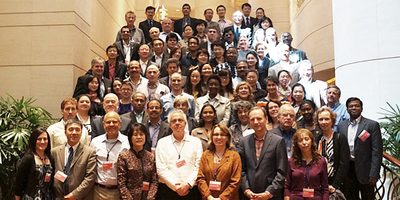
International experience boosts non-communicable disease (NCD) prevention and control in China
The Fourth Forum on Non-communicable Disease (NCD) Management has been successfully held at Beijing on April 16 and 17. The Forum was jointly hosted by The George Institute for Global Health at Peking University Health Science Center, National Office for cerebral-vascular Disease Prevention and control, and National Office for Cancer Prevention and Control.
Domestic and international leaders, experts, leading scholars from more than 10 countries in the field of NCDs convened in the capital city of China to discuss key issues concerning the development of NCD management, prevention and control, and exchange ideas on strategies and policies about NCD management in China and worldwide. Over 2000 participants from institutions such as local centers of disease control, clinics, health centers and healthcare stations participated in the large NCD event and learnt the advanced opinions from the experts.
It is widely known that NCD, which includes cardiovascular disease, diabetes, cancers, and many related conditions, is the leading cause of death worldwide, responsible for 85% of all deaths in China alone, and 63% of deaths globally. NCD management has become an urgent health management issue, raising awareness worldwide.
“The government should play a leading role in the prevention and control of NCDs.” In his opening remarks, HAN Qide, Vice-Chairman of the National Committee of the Chinese People’s Political Consultative Conference, pointed out four problems of the NCD management in China from the government perspective. He emphasized on the importance of evidence-based medical research, the implementation of the (low) probability research results to individual patient, the budget and burden, and social justice.
“Although the bird flu has reached Beijing, the forum still attracts hundreds and thousands of attendees. Not only being a sign of trust, it also exhibits the public’s paying great attention to NCD prevention and control.” On behalf of the three hosts of the forum, Professor Wu Yangfeng, Executive Director of The George Institute for Global health at Peking University Health Science Center, remarked in his opening speech, “Though NCD proceeds in slow pace, the work of NCD prevention and control is urgent.”
With the theme of “Learn from international experience; innovate NCD prevention and control”, the Fourth Forum on NCD Management attracted experts from around the world to discuss topics on efficient policies and innovative methods, and called for real actions on NCD management. Professor Cristina Rabadán-Diehl, Acting Director of Office of Global Health of National Heart, Lung, and Blood Institute (NHLBI) introduced in her speech the role and experience of NHLBI Role in global biomedical research and NCD prevention and control. She quoted opinion from Roger Glass, Director of NHI/FIC, to emphasize the importance of international corporation, “International partnerships are crucial to fighting this massive epidemic. All nations are feeling the devastating impact of …non-communicable diseases and, consequently, must be part of the solution. This convergence of interests presents exceptional opportunities - and enormous responsibilities - to those of us in the medical research community.”
Other international experts were mainly from Collaborating Centers of Excellence (COE), a global network established by NHLBI and UnitedHealth Group to enable the development of local research and training infrastructures and to foster research on new or improved programs and measures to prevent or control chronic cardiovascular and pulmonary diseases in developing countries.
On the second day of the Forum, symposiums on different topics were held, providing an opportunity for the public to communicate directly with experts in the fields of diabetes, hypertension, cardiovascular disease, cancer and other NCDs.
This year’s Forum was greatly supported by participants from NCD field, and enables the exchange of experience and ideas. We are much more confident that the work of NCD prevention and control will achieve great success. We are looking forward to meeting again at the next Forum!




